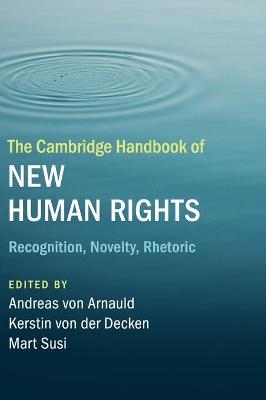
The Cambridge Handbook of New Human Rights
Cambridge University Press (Verlag)
978-1-108-48473-2 (ISBN)
The book provides in-depth insight to scholars, practitioners, and activists dealing with human rights, their expansion, and the emergence of 'new' human rights. Whereas legal theory tends to neglect the development of concrete individual rights, monographs on 'new' rights often deal with structural matters only in passing and the issue of 'new' human rights has received only cursory attention in literature. By bringing together a large number of emergent human rights, analysed by renowned human rights experts from around the world, and combining the analyses with theoretical approaches, this book fills this lacuna. The comprehensive and dialectic approach, which enables insights from individual rights to overarching theory and vice versa, will ensure knowledge growth for generalists and specialists alike. The volume goes beyond a purely legal analysis by observing the contestation, rhetorics, the struggle for recognition of 'new' human rights, thus speaking to human rights professionals beyond the legal sphere.
Andreas von Arnauld is Managing Director of the Walther Schücking Institute of International Law at Christian-Albrechts Universität zu Kiel, Germany. He is the author of an established German textbook on international law and numerous other publications on human rights law, peacekeeping, armed conflict, dispute settlement, comparative constitutional law, and foundations of law. Kerstin von der Decken is a director of the Walther Schücking Institute for International Law at Christian-Albrechts Universität zu Kiel, Germany. She does research and publishes extensively on human rights, focussing on the comparison of human rights systems. She is Visiting Professor at the Law School Wiesbaden at EBS Universität für Wirtschaft und Recht, Universität St Gallen, Switzerland, and Paris-Sorbonne University, Abu Dhabi. Mart Susi is Professor of Human Rights Law and Head of Law School at Tallinn University, Estonia. He is the editor of several volumes focusing on new media, human rights in the digital domain and philosophy of law. Recently he has proposed the Internet Balancing Formula and held seminars on the topic of protecting human rights in the digital domain in various universities across the globe.
Introduction; Part I. Cross-Cutting Observations: 1. Recognition of new human rights: phases, techniques and the approach of 'differentiated traditionalism'; 2. Novelty in new human rights: the decrease in universality and abstractness thesis; 3. Rhetoric of rights: a topical perspective on the functions of claiming a 'human right to …'; Part II. Public Good Rights: 4. Access to water as a new right in international, regional and comparative constitutional law; 5. Comment: something old, something new, something borrowed and something blue: lessons to be learned from the oldest of the 'new' rights – the human right to water; 6. The human right to adequate housing and the new human right to land: congruent entitlements; 7. Comment: the human right to land: 'new right' or 'old wine in a new bottle'?; 8. The right to health under the ICESCR – existing scope, new challenges, and how to deal with it; 9. Comment: strong new branches to the trunk – realizing the right to health decentrally; 10. The human right to a clean environment and rights of nature: between advocacy and reality; 11. Comment: the right to environment: a new, internationally recognized, human right; Part III. Status Rights: 12. The Inter-American Convention on Protecting the Human Rights of Older Persons; 13. Comment: the status of the human rights of older persons; 14. Gender recognition as a human right; 15. Comment: pre-existing rights and future articulations: temporal rhetoric in the struggle for trans rights; 16. The rights of indigenous people – everything old is new again; 17. Comment: the evolution and revolution of indigenous rights; 18. Animal rights; 19. Comment: sentience, form and breath: law's life with animals; Part IV. New Technology Rights: 20. Right to internet access: Quid Iuris?; 21. Comment: the case for the right to meaningful access to internet as a human right in international law; 22. The right to be forgotten; 23. Comment: the RTBF 2.0; 24. The fruits of someone else's labor: gestational surrogacy and rights in the twenty-first century; 25. Comment: birthing new human rights – reflections around a hypothetical human right of access to gestational surrogacy; 26. The relevance of human rights for dealing with the challenges posed by genetics; 27. Comment: the challenge of genetics: human rights on the molecular level?; Part V. Autonomy and Integrity Rights: 28. The right to bodily integrity; 29. Comment: from bodily rights to personal rights; 30. The nascent right to psychological integrity and mental self-determination; 31. Comment: critical reflections on the need for a right to mental self-determination; 32. Rights related to enforced disappearance: new rights in the International Convention for the Protection of All Persons from Enforced Disappearance; 33. Comment: the emergence of the right not to be forcibly disappeared: some comments; 34. The emergent human right to consular notification, access and assistance; 35. Comment from a human right to invoke consular assistance in the host state to a human right to claim diplomatic protection from one's state of nationality?; Part VI. Governance Rights: 36. Remnants of a constitutional moment: the right to democracy in international law; 37. Comment: the human right to democracy in international law: coming to moral terms with an equivocal legal practice; 38. A right to administrative justice – 'new' or just repackaging the old?; 39. Comment: the African right to administrative justice versus the European Union's right to good administration: new human rights?; 40. Anti-corruption: recaptured and reframed; 41. Comment: towards a human rights approach to corruption; 42. Bentham Redux: examining a right of access to law; 43. Comment: a right of access to law – or rather a right of legality and legal aid?
| Erscheinungsdatum | 06.01.2020 |
|---|---|
| Zusatzinfo | Worked examples or Exercises; 2 Line drawings, black and white |
| Verlagsort | Cambridge |
| Sprache | englisch |
| Maße | 184 x 259 mm |
| Gewicht | 1170 g |
| Themenwelt | Recht / Steuern ► EU / Internationales Recht |
| Recht / Steuern ► Öffentliches Recht ► Verfassungsrecht | |
| Recht / Steuern ► Öffentliches Recht ► Völkerrecht | |
| Sozialwissenschaften ► Politik / Verwaltung | |
| ISBN-10 | 1-108-48473-5 / 1108484735 |
| ISBN-13 | 978-1-108-48473-2 / 9781108484732 |
| Zustand | Neuware |
| Haben Sie eine Frage zum Produkt? |
aus dem Bereich


